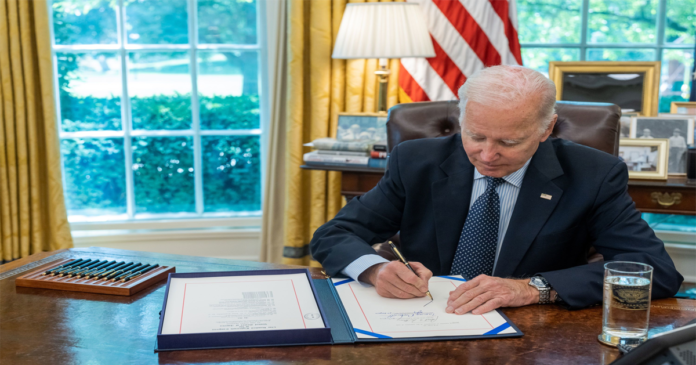President Joe Biden has signed legislation raising the country’s debt ceiling with only two days left, preventing an economically ruinous default on the federal government’s debt.
Biden signs debt limit bill avoiding US default: The White House made public the signing of the agreement, which took place privately at the White House on Saturday, through an email message in which Biden thanked congressional leaders for their cooperation.
The country’s inability to pay all of its obligations by Monday, as previously warned by the Treasury Department, would have rocked the US and the rest of the world’s economies.
After weeks of difficult negotiations between the White House and House Speaker Kevin McCarthy, Republicans have agreed to raise the nation’s borrowing cap without Democrats’s consent to reduce spending.
The debt ceiling is suspended until 2025, which is after the following presidential election, under the final agreement, which was approved by the House on Wednesday and the Senate on Thursday. Government expenditure is also constrained. In an effort to ensure economic stability as the election season heats up, it provides lawmakers with budget targets for the following two years.
“Debt Ceiling Increase: Government to Borrow Money for Existing Bills as Nation’s Debt Reaches $31.4 Trillion”
Increasing the nation’s debt ceiling, currently set at $31.4 trillion, will allow the government to borrow money for paying off existing bills.
“It was crucial to pass this budget agreement. The stakes were at an all-time high, Biden declared Friday night from the Oval Office. Nothing, he claimed, “would have been more catastrophic” than the nation going into default on its debt.
“No one got everything they wanted, but the American people got what they needed,” Biden added, praising the “compromise and consensus” in the agreement. “We avoided a financial crisis and a financial collapse.”
As he stands for re-election, Biden took the chance to highlight the accomplishments of his first term, including support for high-tech industry, infrastructure investments, and financial incentives for combating climate change. He also emphasised how he thwarted Republican attempts to reverse his agenda and enact further budget cutbacks.
Biden stated that his administration is reducing the deficit while also reducing spending. “We’re protecting important priorities, including Veterans Affairs, Social Security, Medicare, Medicaid, and our game-changing investments in clean energy and infrastructure.”
Biden contrasted his party with the Republicans even as he vowed to keep working with them, particularly when it came to the Democratic president’s desire to raise taxes on the rich.
He said that it might be necessary to postpone it until beyond his second term. He declared, “I’ll be coming back. “I’m going to win with your help,” you say.
“Good for the nation”
Biden’s speech provided a comprehensive description of the agreement he and his staff made, emphasizing the Democratic president’s stance on the matter. Although some party members were infuriated by his decision, Biden deliberately chose to remain largely silent during the negotiations to provide both parties with sufficient time to reach a consensus and enable lawmakers to pass the agreement.
Biden commended McCarthy and his negotiators for acting in good faith, and he praised all legislative leaders for ensuring the quick passage of legislation. He claimed that they behaved appropriately and prioritised national interests before personal ones.
Overall, the 99-page plan limits spending for the following two years and makes certain policy changes, such as adding new job requirements for senior citizens getting food assistance and approving a natural gas pipeline through the Appalachian region that many Democrats oppose. Moderates in Congress had long advocated for a change in environmental regulations to speed up the licensing process for infrastructure and energy projects.
“Legislation Passes with Support from Democrats and Republicans: Implications for Veterans, IRS, and Federal Spending”
The Congressional Budget Office calculated that removing job restrictions for veterans, the homeless, and young people transitioning out of foster care would actually increase the total population eligible for federal food assistance.
The law also increased funding for the military and veterans, reduced new funding for the Internal Revenue Service (IRS), and rejected Biden’s proposal to peel back tax incentives for corporations and the rich during the Trump administration in order to help close the country’s deficits.
The IRS’s efforts to increase the enforcement of tax laws for high-income people and corporations, however, will continue, according to the White House.
If Congress did not pass its yearly spending bills, the agreement mandated an automatic overall 1 percent cut to spending programmes. The purpose of doing this was to exert pressure on politicians from both parties to reach an agreement before the fiscal year ended in September.
Democrats supported the legislation in both chambers more than Republicans did, but both parties were essential to its passage.
In the Senate, the vote was 63-36, with 17 Republicans, four Democrats, 46 Democrats and independents, and one independent who caucuses with the Democrats voting in favour.

